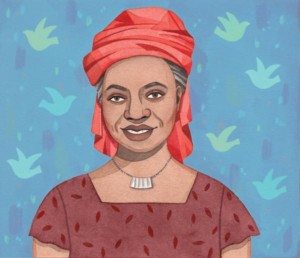In a nation once wracked by civil war, Liberian Rotarian Elizabeth Sele Mulbah has spent much of her life leading efforts for peace and reconciliation.
A past president (2011-12) of the Rotary Club of Sinkor, Mulbah has a remarkable résumé. She began her career as a nurse, moved into teaching and administration, took on a leadership role at the Christian Health Association of Liberia, and worked at the United Nations Development Program.
She’s a co-founder of the Mano River Women Peace Network (Marwopnet), and through that organization played a major role in multinational diplomacy. She’s also an in-demand speaker, giving lectures at places such as the Carter Center and the U.S. Institute of Peace.

Illustration by Monica Garwood
Q: You started your career as a nurse but soon moved into administration, where you advocated for change in the profession. What were you seeking to change and improve in nursing?
A: I’ve worked in training, counseling, and advocating for equal benefits, such as the right to the same period for maternity leave for working women whether married or not. I’ve advocated for on-the-job training for all, including support staff such as nurses’ aides.
Q: You became active in peace work in the 1990s, during the Liberian civil war. How did that come about?
A: Women in Liberia were disappointed at the failure of previous peace conferences. Liberians were tired of war. In 1995, Marion Subah and I, who were working at the Christian Health Association of Liberia, were approved by heads of warring factions to facilitate a meeting to prepare them for the next peace conference. The planned one-day meeting extended to four days, and all parties were represented. It was successful.
Q: What are the origins of Marwopnet?
A: It began in 2000 when 10 women leaders from NGOs in the region came together to convince the leaders of Liberia and Guinea to return to the conference table until peace was achieved. We did this after learning that the two leaders had vowed not to sit under the same roof. They did return to the conference table, and peace was achieved.
Today we shuttle between the leaders of the four Mano River countries (Guinea, Liberia, Sierra Leone, and Côte d’Ivoire), and when the need arises, we serve as election observers in these nations. Women as mothers are born peacemakers.
Q: After the Liberian civil war, you worked in reconciliation and trauma healing. What exactly were you doing?
A: We first underwent our own training and then provided training for those traumatized by the war. We focused on teachers, health workers, and pastors to make sure conflicts were not transferred to the hospitals, schools, and churches where victims and perpetrators were bound to come together or interact. The goal was forgiveness.
Q: What organizations are you most active in today?
A: I am vice chair of the Governance Commission, which was created by the Accra peace accord in 2003 after Liberia’s most recent civil war, to design policies and recommend strategies to establish an inclusive, participatory, just, and accountable system of government.
Q: What is your guiding philosophy in life?
A: That it doesa not matter who gets the credit when something is done to benefit mankind. And that no one is here by mistake.

Leave A Comment
You must be logged in to post a comment.